Business Environment: Fiscal, Monetary Policy, and Global Aspects
VerifiedAdded on 2023/01/18
|13
|4400
|75
Report
AI Summary
This report provides an in-depth analysis of the UK business environment, focusing on the impact of fiscal and monetary policies on business organizations. It examines the role of monetary policy, including the effects of bank rates and quantitative easing, and how these tools influence inflation, investment, and economic growth. The report also explores fiscal policy, detailing the elements of expenditure and taxation, and their influence on business operations and employment. Furthermore, it considers the development of global and regional aspects that shape business activities. The report highlights the importance of understanding these factors for businesses to manage productivity, adapt to technological advancements, and navigate economic fluctuations. It provides a comprehensive overview of the UK business landscape, offering insights into the interplay of various economic instruments and their consequences.
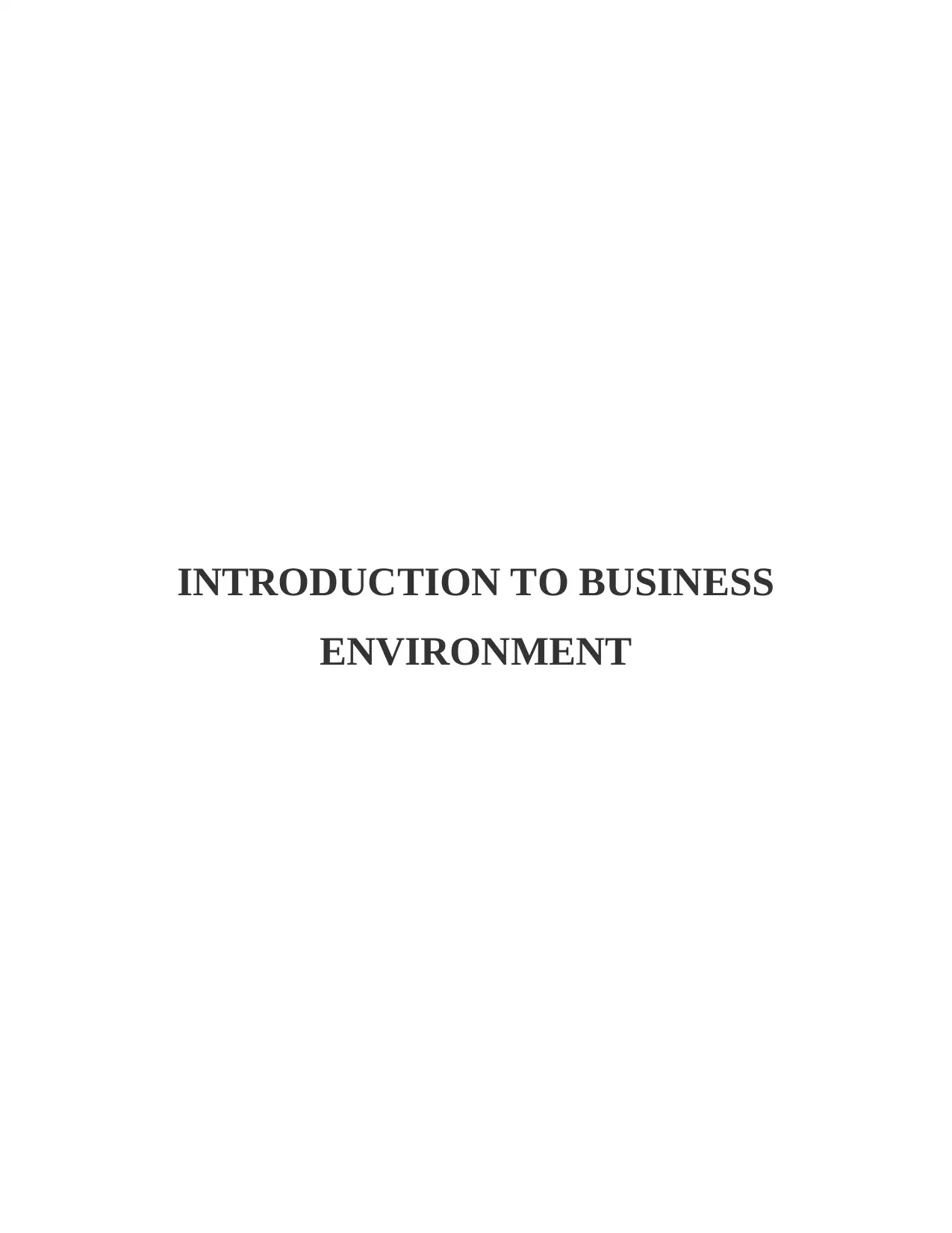
INTRODUCTION TO BUSINESS
ENVIRONMENT
ENVIRONMENT
Paraphrase This Document
Need a fresh take? Get an instant paraphrase of this document with our AI Paraphraser
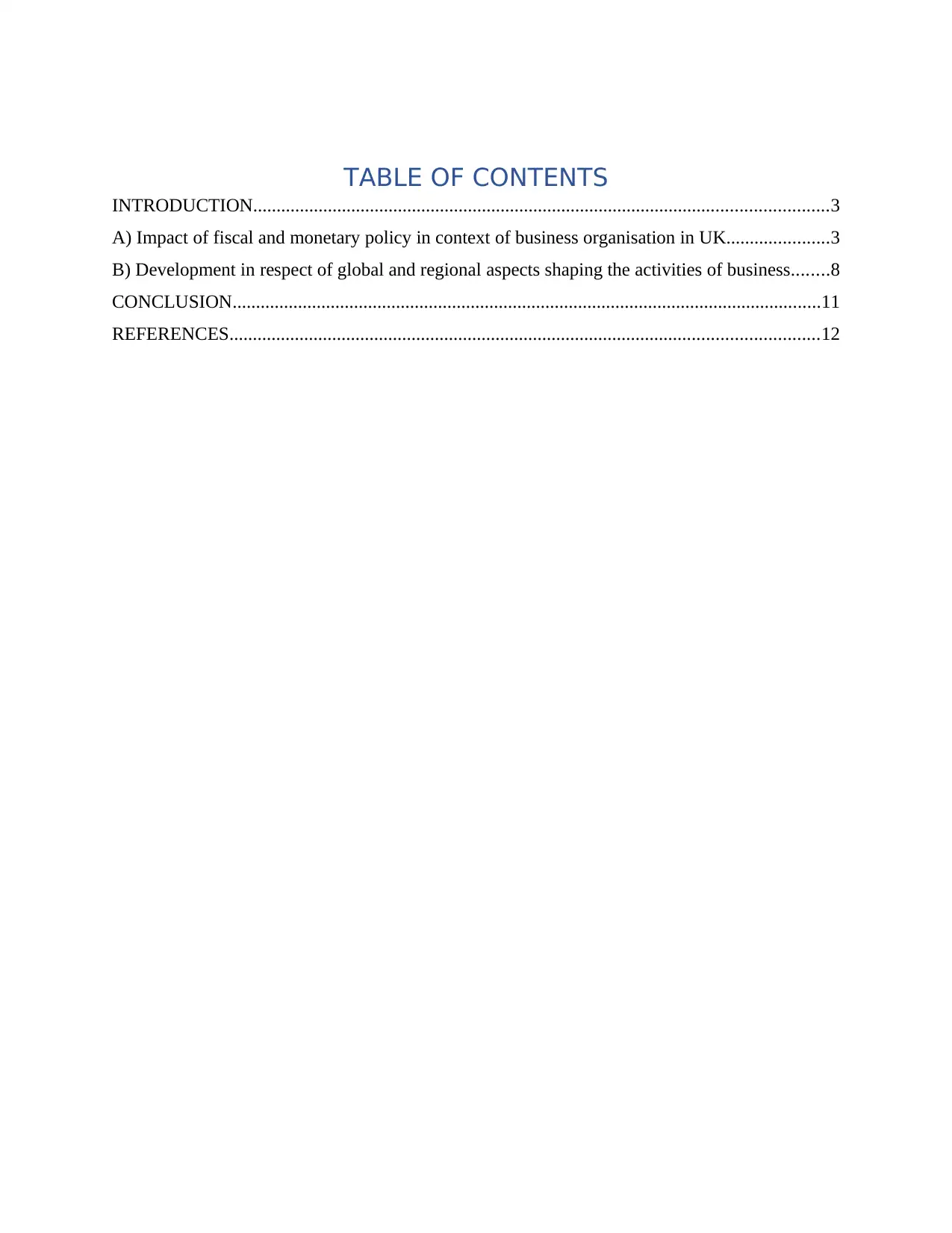
TABLE OF CONTENTS
INTRODUCTION...........................................................................................................................3
A) Impact of fiscal and monetary policy in context of business organisation in UK......................3
B) Development in respect of global and regional aspects shaping the activities of business........8
CONCLUSION..............................................................................................................................11
REFERENCES..............................................................................................................................12
INTRODUCTION...........................................................................................................................3
A) Impact of fiscal and monetary policy in context of business organisation in UK......................3
B) Development in respect of global and regional aspects shaping the activities of business........8
CONCLUSION..............................................................................................................................11
REFERENCES..............................................................................................................................12
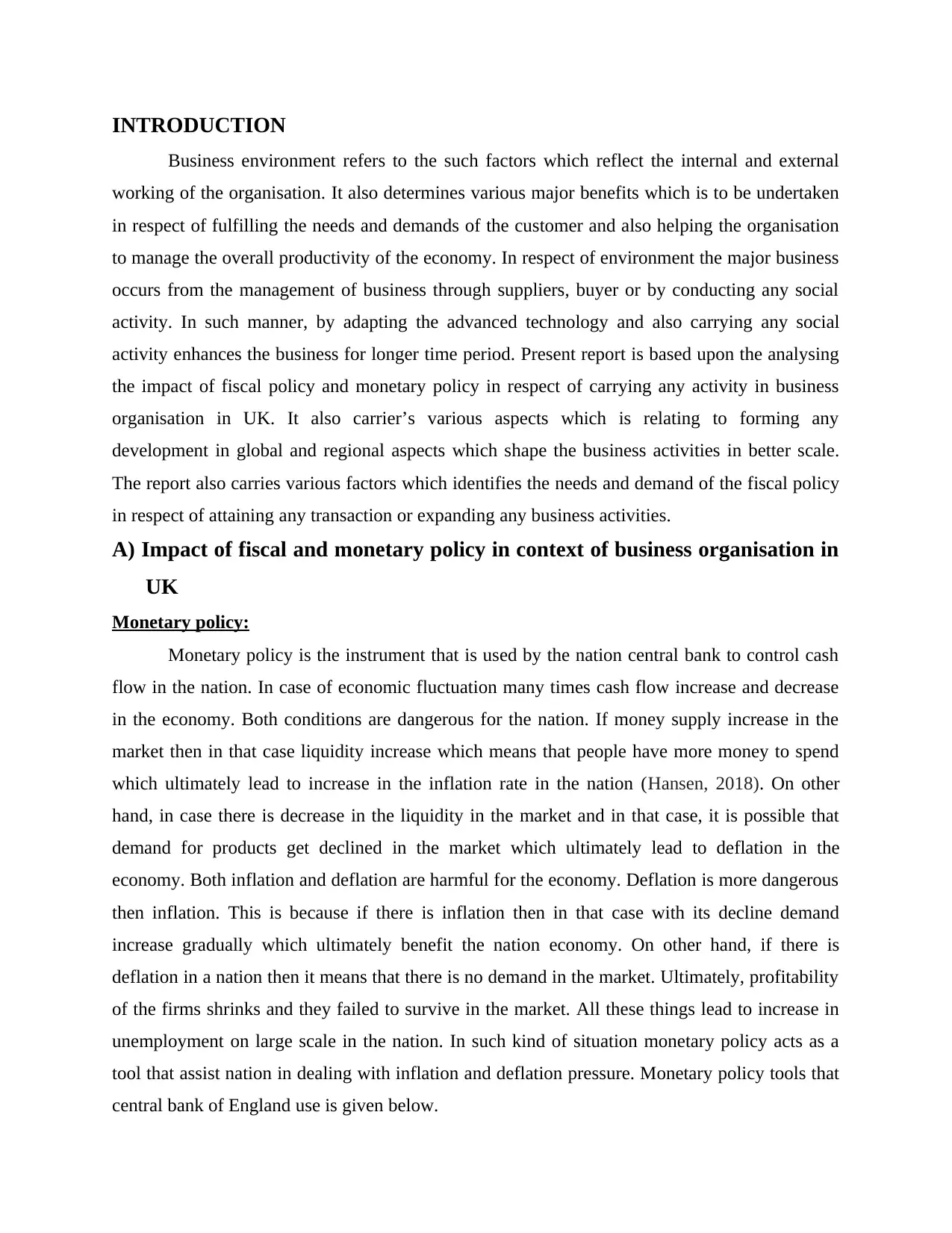
INTRODUCTION
Business environment refers to the such factors which reflect the internal and external
working of the organisation. It also determines various major benefits which is to be undertaken
in respect of fulfilling the needs and demands of the customer and also helping the organisation
to manage the overall productivity of the economy. In respect of environment the major business
occurs from the management of business through suppliers, buyer or by conducting any social
activity. In such manner, by adapting the advanced technology and also carrying any social
activity enhances the business for longer time period. Present report is based upon the analysing
the impact of fiscal policy and monetary policy in respect of carrying any activity in business
organisation in UK. It also carrier’s various aspects which is relating to forming any
development in global and regional aspects which shape the business activities in better scale.
The report also carries various factors which identifies the needs and demand of the fiscal policy
in respect of attaining any transaction or expanding any business activities.
A) Impact of fiscal and monetary policy in context of business organisation in
UK
Monetary policy:
Monetary policy is the instrument that is used by the nation central bank to control cash
flow in the nation. In case of economic fluctuation many times cash flow increase and decrease
in the economy. Both conditions are dangerous for the nation. If money supply increase in the
market then in that case liquidity increase which means that people have more money to spend
which ultimately lead to increase in the inflation rate in the nation (Hansen, 2018). On other
hand, in case there is decrease in the liquidity in the market and in that case, it is possible that
demand for products get declined in the market which ultimately lead to deflation in the
economy. Both inflation and deflation are harmful for the economy. Deflation is more dangerous
then inflation. This is because if there is inflation then in that case with its decline demand
increase gradually which ultimately benefit the nation economy. On other hand, if there is
deflation in a nation then it means that there is no demand in the market. Ultimately, profitability
of the firms shrinks and they failed to survive in the market. All these things lead to increase in
unemployment on large scale in the nation. In such kind of situation monetary policy acts as a
tool that assist nation in dealing with inflation and deflation pressure. Monetary policy tools that
central bank of England use is given below.
Business environment refers to the such factors which reflect the internal and external
working of the organisation. It also determines various major benefits which is to be undertaken
in respect of fulfilling the needs and demands of the customer and also helping the organisation
to manage the overall productivity of the economy. In respect of environment the major business
occurs from the management of business through suppliers, buyer or by conducting any social
activity. In such manner, by adapting the advanced technology and also carrying any social
activity enhances the business for longer time period. Present report is based upon the analysing
the impact of fiscal policy and monetary policy in respect of carrying any activity in business
organisation in UK. It also carrier’s various aspects which is relating to forming any
development in global and regional aspects which shape the business activities in better scale.
The report also carries various factors which identifies the needs and demand of the fiscal policy
in respect of attaining any transaction or expanding any business activities.
A) Impact of fiscal and monetary policy in context of business organisation in
UK
Monetary policy:
Monetary policy is the instrument that is used by the nation central bank to control cash
flow in the nation. In case of economic fluctuation many times cash flow increase and decrease
in the economy. Both conditions are dangerous for the nation. If money supply increase in the
market then in that case liquidity increase which means that people have more money to spend
which ultimately lead to increase in the inflation rate in the nation (Hansen, 2018). On other
hand, in case there is decrease in the liquidity in the market and in that case, it is possible that
demand for products get declined in the market which ultimately lead to deflation in the
economy. Both inflation and deflation are harmful for the economy. Deflation is more dangerous
then inflation. This is because if there is inflation then in that case with its decline demand
increase gradually which ultimately benefit the nation economy. On other hand, if there is
deflation in a nation then it means that there is no demand in the market. Ultimately, profitability
of the firms shrinks and they failed to survive in the market. All these things lead to increase in
unemployment on large scale in the nation. In such kind of situation monetary policy acts as a
tool that assist nation in dealing with inflation and deflation pressure. Monetary policy tools that
central bank of England use is given below.
⊘ This is a preview!⊘
Do you want full access?
Subscribe today to unlock all pages.

Trusted by 1+ million students worldwide
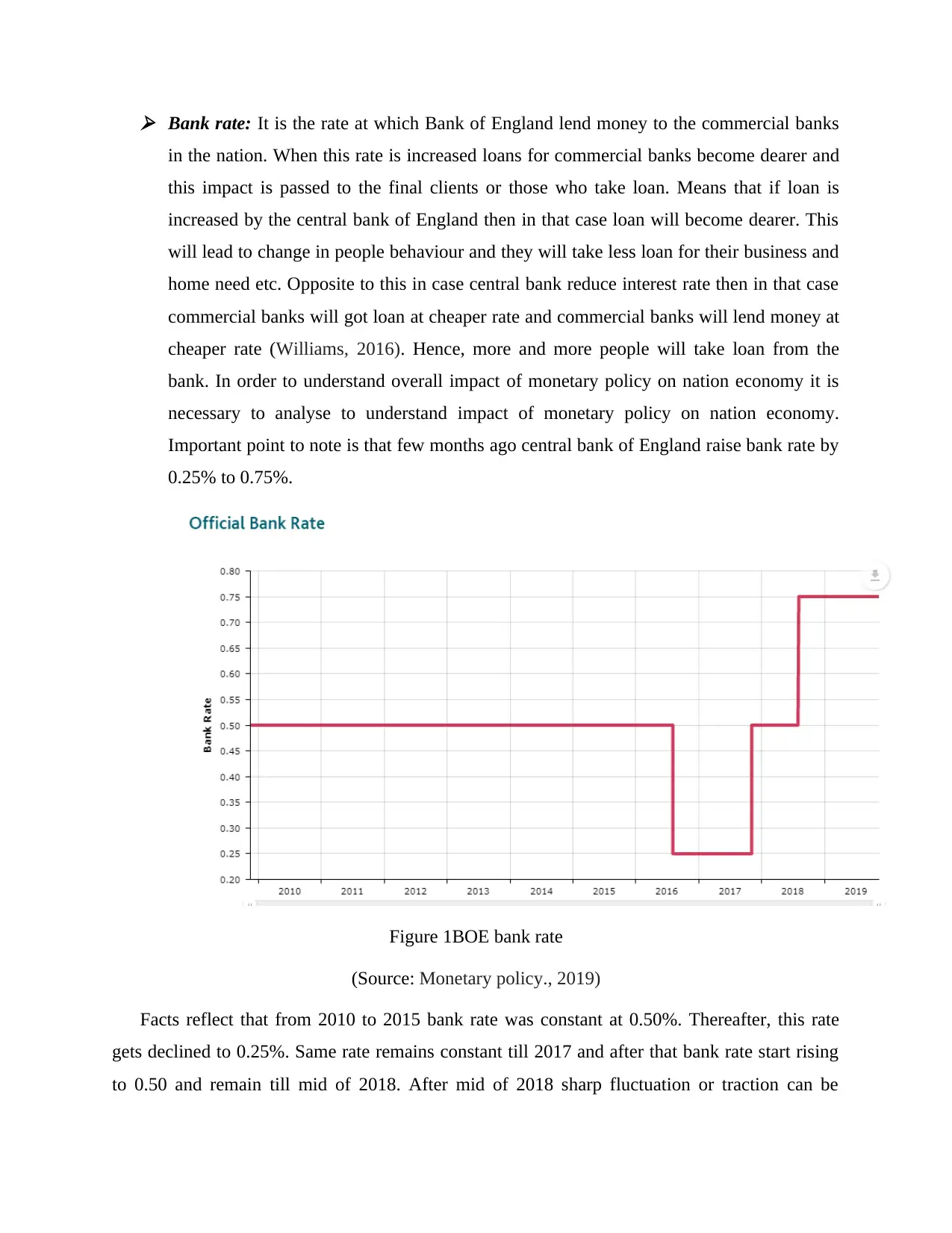
Bank rate: It is the rate at which Bank of England lend money to the commercial banks
in the nation. When this rate is increased loans for commercial banks become dearer and
this impact is passed to the final clients or those who take loan. Means that if loan is
increased by the central bank of England then in that case loan will become dearer. This
will lead to change in people behaviour and they will take less loan for their business and
home need etc. Opposite to this in case central bank reduce interest rate then in that case
commercial banks will got loan at cheaper rate and commercial banks will lend money at
cheaper rate (Williams, 2016). Hence, more and more people will take loan from the
bank. In order to understand overall impact of monetary policy on nation economy it is
necessary to analyse to understand impact of monetary policy on nation economy.
Important point to note is that few months ago central bank of England raise bank rate by
0.25% to 0.75%.
Figure 1BOE bank rate
(Source: Monetary policy., 2019)
Facts reflect that from 2010 to 2015 bank rate was constant at 0.50%. Thereafter, this rate
gets declined to 0.25%. Same rate remains constant till 2017 and after that bank rate start rising
to 0.50 and remain till mid of 2018. After mid of 2018 sharp fluctuation or traction can be
in the nation. When this rate is increased loans for commercial banks become dearer and
this impact is passed to the final clients or those who take loan. Means that if loan is
increased by the central bank of England then in that case loan will become dearer. This
will lead to change in people behaviour and they will take less loan for their business and
home need etc. Opposite to this in case central bank reduce interest rate then in that case
commercial banks will got loan at cheaper rate and commercial banks will lend money at
cheaper rate (Williams, 2016). Hence, more and more people will take loan from the
bank. In order to understand overall impact of monetary policy on nation economy it is
necessary to analyse to understand impact of monetary policy on nation economy.
Important point to note is that few months ago central bank of England raise bank rate by
0.25% to 0.75%.
Figure 1BOE bank rate
(Source: Monetary policy., 2019)
Facts reflect that from 2010 to 2015 bank rate was constant at 0.50%. Thereafter, this rate
gets declined to 0.25%. Same rate remains constant till 2017 and after that bank rate start rising
to 0.50 and remain till mid of 2018. After mid of 2018 sharp fluctuation or traction can be
Paraphrase This Document
Need a fresh take? Get an instant paraphrase of this document with our AI Paraphraser
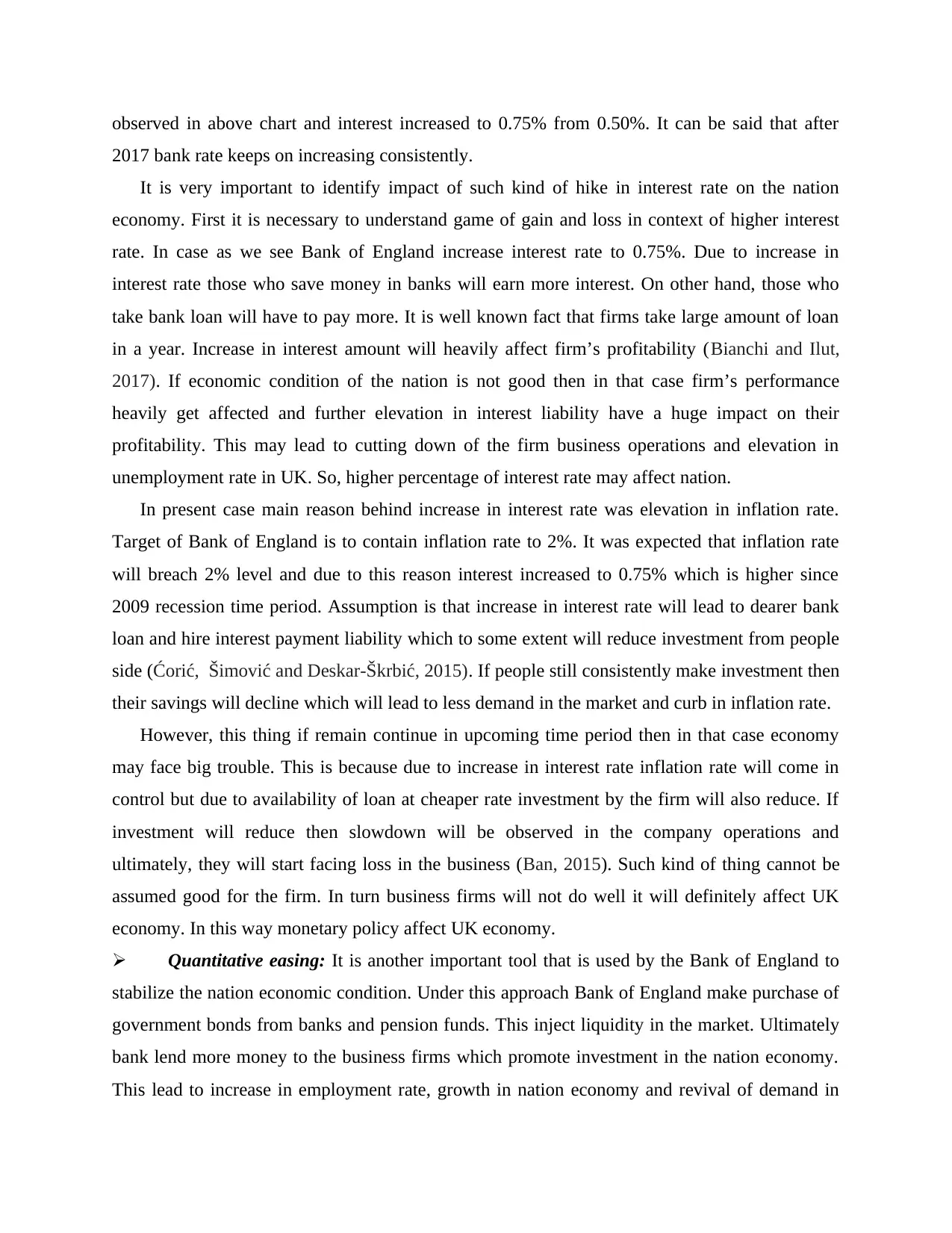
observed in above chart and interest increased to 0.75% from 0.50%. It can be said that after
2017 bank rate keeps on increasing consistently.
It is very important to identify impact of such kind of hike in interest rate on the nation
economy. First it is necessary to understand game of gain and loss in context of higher interest
rate. In case as we see Bank of England increase interest rate to 0.75%. Due to increase in
interest rate those who save money in banks will earn more interest. On other hand, those who
take bank loan will have to pay more. It is well known fact that firms take large amount of loan
in a year. Increase in interest amount will heavily affect firm’s profitability (Bianchi and Ilut,
2017). If economic condition of the nation is not good then in that case firm’s performance
heavily get affected and further elevation in interest liability have a huge impact on their
profitability. This may lead to cutting down of the firm business operations and elevation in
unemployment rate in UK. So, higher percentage of interest rate may affect nation.
In present case main reason behind increase in interest rate was elevation in inflation rate.
Target of Bank of England is to contain inflation rate to 2%. It was expected that inflation rate
will breach 2% level and due to this reason interest increased to 0.75% which is higher since
2009 recession time period. Assumption is that increase in interest rate will lead to dearer bank
loan and hire interest payment liability which to some extent will reduce investment from people
side (Ćorić, Šimović and Deskar-Škrbić, 2015). If people still consistently make investment then
their savings will decline which will lead to less demand in the market and curb in inflation rate.
However, this thing if remain continue in upcoming time period then in that case economy
may face big trouble. This is because due to increase in interest rate inflation rate will come in
control but due to availability of loan at cheaper rate investment by the firm will also reduce. If
investment will reduce then slowdown will be observed in the company operations and
ultimately, they will start facing loss in the business (Ban, 2015). Such kind of thing cannot be
assumed good for the firm. In turn business firms will not do well it will definitely affect UK
economy. In this way monetary policy affect UK economy.
Quantitative easing: It is another important tool that is used by the Bank of England to
stabilize the nation economic condition. Under this approach Bank of England make purchase of
government bonds from banks and pension funds. This inject liquidity in the market. Ultimately
bank lend more money to the business firms which promote investment in the nation economy.
This lead to increase in employment rate, growth in nation economy and revival of demand in
2017 bank rate keeps on increasing consistently.
It is very important to identify impact of such kind of hike in interest rate on the nation
economy. First it is necessary to understand game of gain and loss in context of higher interest
rate. In case as we see Bank of England increase interest rate to 0.75%. Due to increase in
interest rate those who save money in banks will earn more interest. On other hand, those who
take bank loan will have to pay more. It is well known fact that firms take large amount of loan
in a year. Increase in interest amount will heavily affect firm’s profitability (Bianchi and Ilut,
2017). If economic condition of the nation is not good then in that case firm’s performance
heavily get affected and further elevation in interest liability have a huge impact on their
profitability. This may lead to cutting down of the firm business operations and elevation in
unemployment rate in UK. So, higher percentage of interest rate may affect nation.
In present case main reason behind increase in interest rate was elevation in inflation rate.
Target of Bank of England is to contain inflation rate to 2%. It was expected that inflation rate
will breach 2% level and due to this reason interest increased to 0.75% which is higher since
2009 recession time period. Assumption is that increase in interest rate will lead to dearer bank
loan and hire interest payment liability which to some extent will reduce investment from people
side (Ćorić, Šimović and Deskar-Škrbić, 2015). If people still consistently make investment then
their savings will decline which will lead to less demand in the market and curb in inflation rate.
However, this thing if remain continue in upcoming time period then in that case economy
may face big trouble. This is because due to increase in interest rate inflation rate will come in
control but due to availability of loan at cheaper rate investment by the firm will also reduce. If
investment will reduce then slowdown will be observed in the company operations and
ultimately, they will start facing loss in the business (Ban, 2015). Such kind of thing cannot be
assumed good for the firm. In turn business firms will not do well it will definitely affect UK
economy. In this way monetary policy affect UK economy.
Quantitative easing: It is another important tool that is used by the Bank of England to
stabilize the nation economic condition. Under this approach Bank of England make purchase of
government bonds from banks and pension funds. This inject liquidity in the market. Ultimately
bank lend more money to the business firms which promote investment in the nation economy.
This lead to increase in employment rate, growth in nation economy and revival of demand in
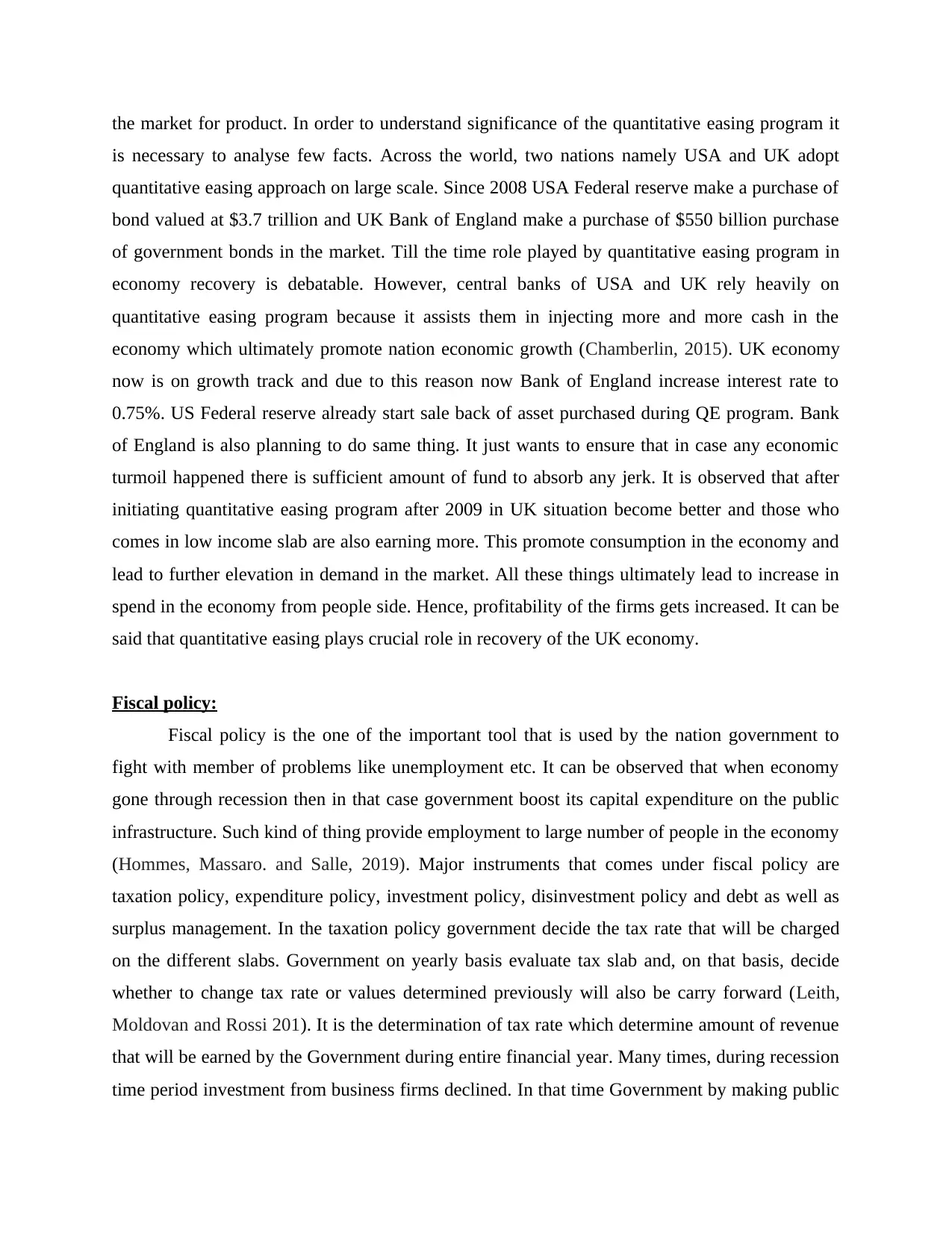
the market for product. In order to understand significance of the quantitative easing program it
is necessary to analyse few facts. Across the world, two nations namely USA and UK adopt
quantitative easing approach on large scale. Since 2008 USA Federal reserve make a purchase of
bond valued at $3.7 trillion and UK Bank of England make a purchase of $550 billion purchase
of government bonds in the market. Till the time role played by quantitative easing program in
economy recovery is debatable. However, central banks of USA and UK rely heavily on
quantitative easing program because it assists them in injecting more and more cash in the
economy which ultimately promote nation economic growth (Chamberlin, 2015). UK economy
now is on growth track and due to this reason now Bank of England increase interest rate to
0.75%. US Federal reserve already start sale back of asset purchased during QE program. Bank
of England is also planning to do same thing. It just wants to ensure that in case any economic
turmoil happened there is sufficient amount of fund to absorb any jerk. It is observed that after
initiating quantitative easing program after 2009 in UK situation become better and those who
comes in low income slab are also earning more. This promote consumption in the economy and
lead to further elevation in demand in the market. All these things ultimately lead to increase in
spend in the economy from people side. Hence, profitability of the firms gets increased. It can be
said that quantitative easing plays crucial role in recovery of the UK economy.
Fiscal policy:
Fiscal policy is the one of the important tool that is used by the nation government to
fight with member of problems like unemployment etc. It can be observed that when economy
gone through recession then in that case government boost its capital expenditure on the public
infrastructure. Such kind of thing provide employment to large number of people in the economy
(Hommes, Massaro. and Salle, 2019). Major instruments that comes under fiscal policy are
taxation policy, expenditure policy, investment policy, disinvestment policy and debt as well as
surplus management. In the taxation policy government decide the tax rate that will be charged
on the different slabs. Government on yearly basis evaluate tax slab and, on that basis, decide
whether to change tax rate or values determined previously will also be carry forward (Leith,
Moldovan and Rossi 201). It is the determination of tax rate which determine amount of revenue
that will be earned by the Government during entire financial year. Many times, during recession
time period investment from business firms declined. In that time Government by making public
is necessary to analyse few facts. Across the world, two nations namely USA and UK adopt
quantitative easing approach on large scale. Since 2008 USA Federal reserve make a purchase of
bond valued at $3.7 trillion and UK Bank of England make a purchase of $550 billion purchase
of government bonds in the market. Till the time role played by quantitative easing program in
economy recovery is debatable. However, central banks of USA and UK rely heavily on
quantitative easing program because it assists them in injecting more and more cash in the
economy which ultimately promote nation economic growth (Chamberlin, 2015). UK economy
now is on growth track and due to this reason now Bank of England increase interest rate to
0.75%. US Federal reserve already start sale back of asset purchased during QE program. Bank
of England is also planning to do same thing. It just wants to ensure that in case any economic
turmoil happened there is sufficient amount of fund to absorb any jerk. It is observed that after
initiating quantitative easing program after 2009 in UK situation become better and those who
comes in low income slab are also earning more. This promote consumption in the economy and
lead to further elevation in demand in the market. All these things ultimately lead to increase in
spend in the economy from people side. Hence, profitability of the firms gets increased. It can be
said that quantitative easing plays crucial role in recovery of the UK economy.
Fiscal policy:
Fiscal policy is the one of the important tool that is used by the nation government to
fight with member of problems like unemployment etc. It can be observed that when economy
gone through recession then in that case government boost its capital expenditure on the public
infrastructure. Such kind of thing provide employment to large number of people in the economy
(Hommes, Massaro. and Salle, 2019). Major instruments that comes under fiscal policy are
taxation policy, expenditure policy, investment policy, disinvestment policy and debt as well as
surplus management. In the taxation policy government decide the tax rate that will be charged
on the different slabs. Government on yearly basis evaluate tax slab and, on that basis, decide
whether to change tax rate or values determined previously will also be carry forward (Leith,
Moldovan and Rossi 201). It is the determination of tax rate which determine amount of revenue
that will be earned by the Government during entire financial year. Many times, during recession
time period investment from business firms declined. In that time Government by making public
⊘ This is a preview!⊘
Do you want full access?
Subscribe today to unlock all pages.

Trusted by 1+ million students worldwide
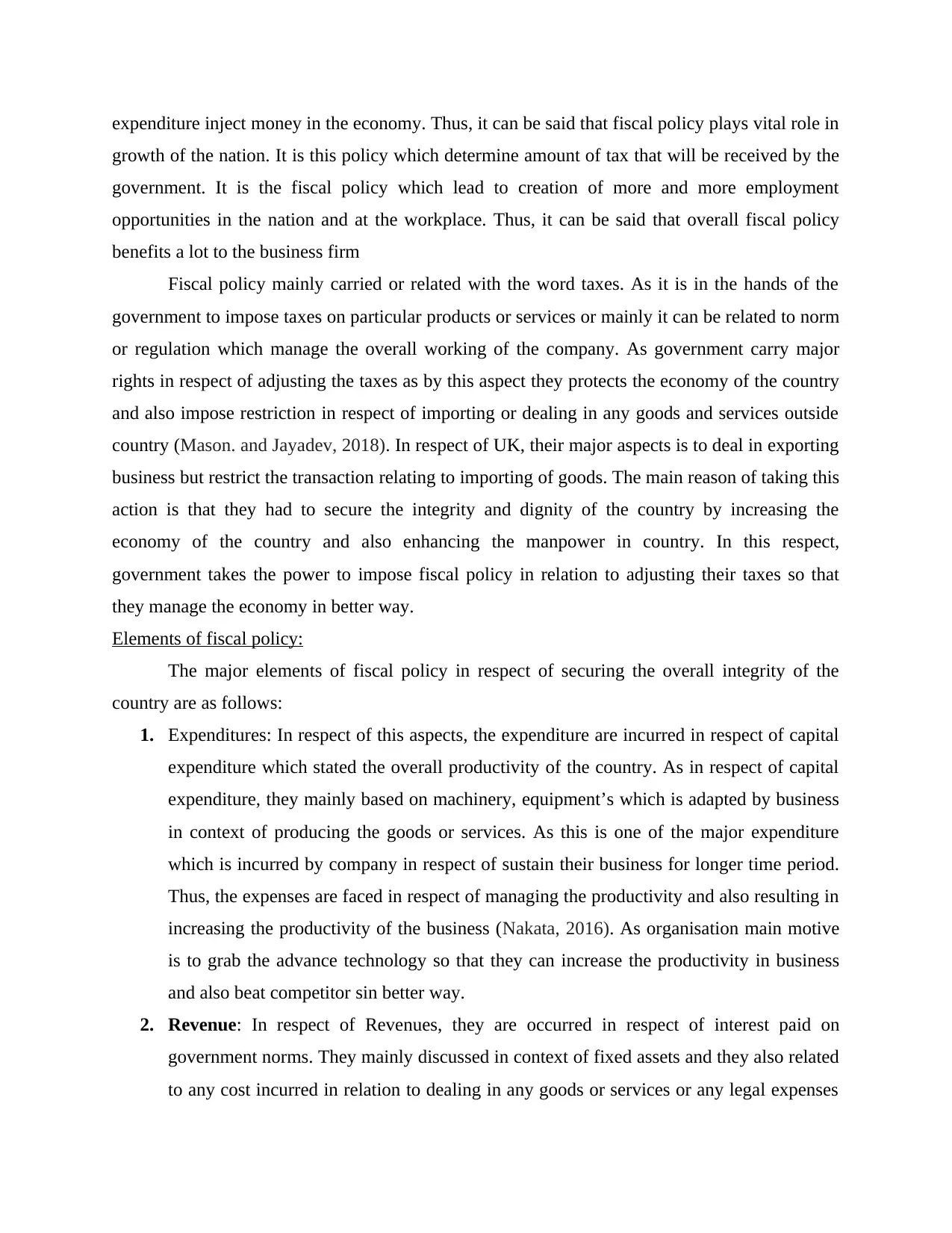
expenditure inject money in the economy. Thus, it can be said that fiscal policy plays vital role in
growth of the nation. It is this policy which determine amount of tax that will be received by the
government. It is the fiscal policy which lead to creation of more and more employment
opportunities in the nation and at the workplace. Thus, it can be said that overall fiscal policy
benefits a lot to the business firm
Fiscal policy mainly carried or related with the word taxes. As it is in the hands of the
government to impose taxes on particular products or services or mainly it can be related to norm
or regulation which manage the overall working of the company. As government carry major
rights in respect of adjusting the taxes as by this aspect they protects the economy of the country
and also impose restriction in respect of importing or dealing in any goods and services outside
country (Mason. and Jayadev, 2018). In respect of UK, their major aspects is to deal in exporting
business but restrict the transaction relating to importing of goods. The main reason of taking this
action is that they had to secure the integrity and dignity of the country by increasing the
economy of the country and also enhancing the manpower in country. In this respect,
government takes the power to impose fiscal policy in relation to adjusting their taxes so that
they manage the economy in better way.
Elements of fiscal policy:
The major elements of fiscal policy in respect of securing the overall integrity of the
country are as follows:
1. Expenditures: In respect of this aspects, the expenditure are incurred in respect of capital
expenditure which stated the overall productivity of the country. As in respect of capital
expenditure, they mainly based on machinery, equipment’s which is adapted by business
in context of producing the goods or services. As this is one of the major expenditure
which is incurred by company in respect of sustain their business for longer time period.
Thus, the expenses are faced in respect of managing the productivity and also resulting in
increasing the productivity of the business (Nakata, 2016). As organisation main motive
is to grab the advance technology so that they can increase the productivity in business
and also beat competitor sin better way.
2. Revenue: In respect of Revenues, they are occurred in respect of interest paid on
government norms. They mainly discussed in context of fixed assets and they also related
to any cost incurred in relation to dealing in any goods or services or any legal expenses
growth of the nation. It is this policy which determine amount of tax that will be received by the
government. It is the fiscal policy which lead to creation of more and more employment
opportunities in the nation and at the workplace. Thus, it can be said that overall fiscal policy
benefits a lot to the business firm
Fiscal policy mainly carried or related with the word taxes. As it is in the hands of the
government to impose taxes on particular products or services or mainly it can be related to norm
or regulation which manage the overall working of the company. As government carry major
rights in respect of adjusting the taxes as by this aspect they protects the economy of the country
and also impose restriction in respect of importing or dealing in any goods and services outside
country (Mason. and Jayadev, 2018). In respect of UK, their major aspects is to deal in exporting
business but restrict the transaction relating to importing of goods. The main reason of taking this
action is that they had to secure the integrity and dignity of the country by increasing the
economy of the country and also enhancing the manpower in country. In this respect,
government takes the power to impose fiscal policy in relation to adjusting their taxes so that
they manage the economy in better way.
Elements of fiscal policy:
The major elements of fiscal policy in respect of securing the overall integrity of the
country are as follows:
1. Expenditures: In respect of this aspects, the expenditure are incurred in respect of capital
expenditure which stated the overall productivity of the country. As in respect of capital
expenditure, they mainly based on machinery, equipment’s which is adapted by business
in context of producing the goods or services. As this is one of the major expenditure
which is incurred by company in respect of sustain their business for longer time period.
Thus, the expenses are faced in respect of managing the productivity and also resulting in
increasing the productivity of the business (Nakata, 2016). As organisation main motive
is to grab the advance technology so that they can increase the productivity in business
and also beat competitor sin better way.
2. Revenue: In respect of Revenues, they are occurred in respect of interest paid on
government norms. They mainly discussed in context of fixed assets and they also related
to any cost incurred in relation to dealing in any goods or services or any legal expenses
Paraphrase This Document
Need a fresh take? Get an instant paraphrase of this document with our AI Paraphraser
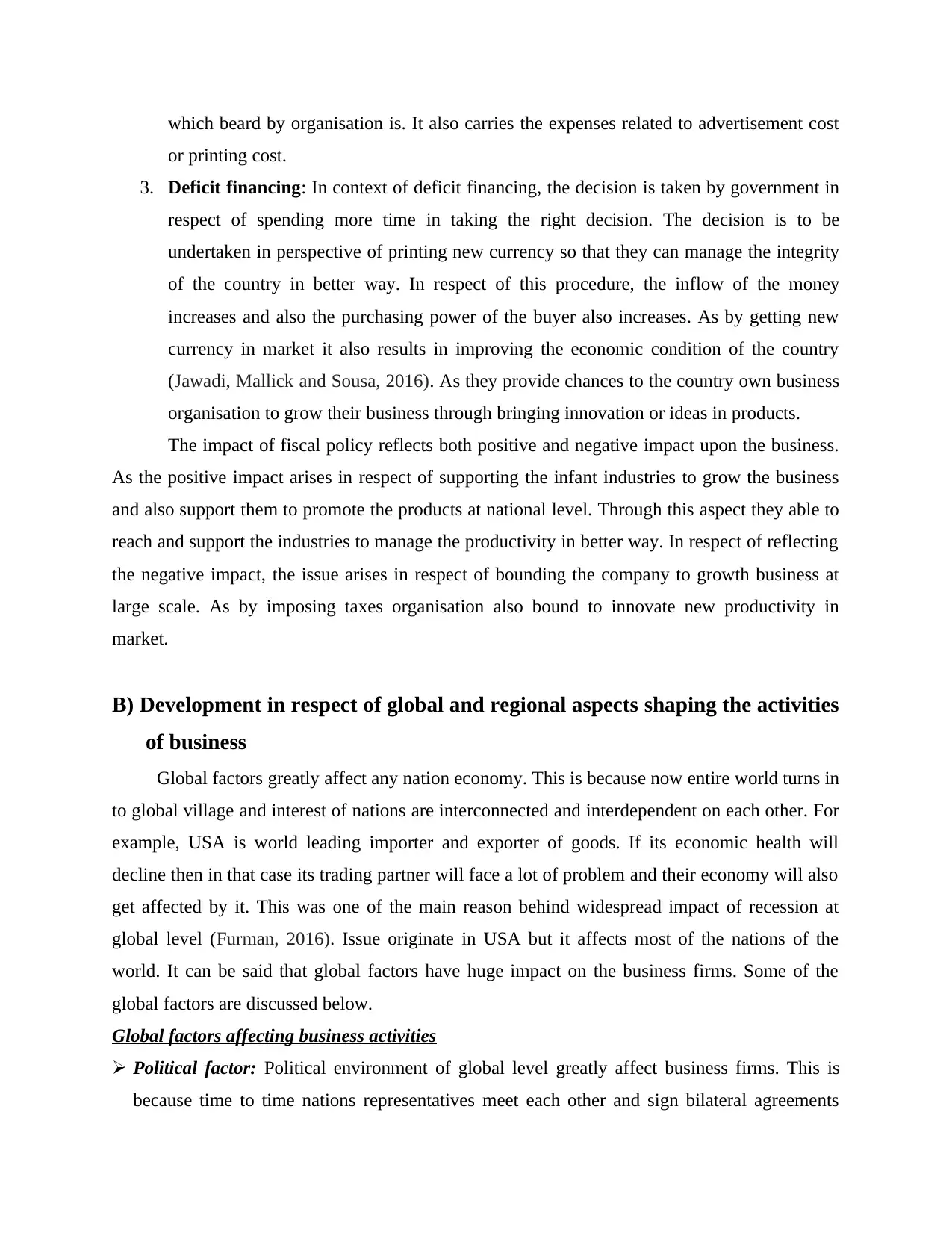
which beard by organisation is. It also carries the expenses related to advertisement cost
or printing cost.
3. Deficit financing: In context of deficit financing, the decision is taken by government in
respect of spending more time in taking the right decision. The decision is to be
undertaken in perspective of printing new currency so that they can manage the integrity
of the country in better way. In respect of this procedure, the inflow of the money
increases and also the purchasing power of the buyer also increases. As by getting new
currency in market it also results in improving the economic condition of the country
(Jawadi, Mallick and Sousa, 2016). As they provide chances to the country own business
organisation to grow their business through bringing innovation or ideas in products.
The impact of fiscal policy reflects both positive and negative impact upon the business.
As the positive impact arises in respect of supporting the infant industries to grow the business
and also support them to promote the products at national level. Through this aspect they able to
reach and support the industries to manage the productivity in better way. In respect of reflecting
the negative impact, the issue arises in respect of bounding the company to growth business at
large scale. As by imposing taxes organisation also bound to innovate new productivity in
market.
B) Development in respect of global and regional aspects shaping the activities
of business
Global factors greatly affect any nation economy. This is because now entire world turns in
to global village and interest of nations are interconnected and interdependent on each other. For
example, USA is world leading importer and exporter of goods. If its economic health will
decline then in that case its trading partner will face a lot of problem and their economy will also
get affected by it. This was one of the main reason behind widespread impact of recession at
global level (Furman, 2016). Issue originate in USA but it affects most of the nations of the
world. It can be said that global factors have huge impact on the business firms. Some of the
global factors are discussed below.
Global factors affecting business activities
Political factor: Political environment of global level greatly affect business firms. This is
because time to time nations representatives meet each other and sign bilateral agreements
or printing cost.
3. Deficit financing: In context of deficit financing, the decision is taken by government in
respect of spending more time in taking the right decision. The decision is to be
undertaken in perspective of printing new currency so that they can manage the integrity
of the country in better way. In respect of this procedure, the inflow of the money
increases and also the purchasing power of the buyer also increases. As by getting new
currency in market it also results in improving the economic condition of the country
(Jawadi, Mallick and Sousa, 2016). As they provide chances to the country own business
organisation to grow their business through bringing innovation or ideas in products.
The impact of fiscal policy reflects both positive and negative impact upon the business.
As the positive impact arises in respect of supporting the infant industries to grow the business
and also support them to promote the products at national level. Through this aspect they able to
reach and support the industries to manage the productivity in better way. In respect of reflecting
the negative impact, the issue arises in respect of bounding the company to growth business at
large scale. As by imposing taxes organisation also bound to innovate new productivity in
market.
B) Development in respect of global and regional aspects shaping the activities
of business
Global factors greatly affect any nation economy. This is because now entire world turns in
to global village and interest of nations are interconnected and interdependent on each other. For
example, USA is world leading importer and exporter of goods. If its economic health will
decline then in that case its trading partner will face a lot of problem and their economy will also
get affected by it. This was one of the main reason behind widespread impact of recession at
global level (Furman, 2016). Issue originate in USA but it affects most of the nations of the
world. It can be said that global factors have huge impact on the business firms. Some of the
global factors are discussed below.
Global factors affecting business activities
Political factor: Political environment of global level greatly affect business firms. This is
because time to time nations representatives meet each other and sign bilateral agreements
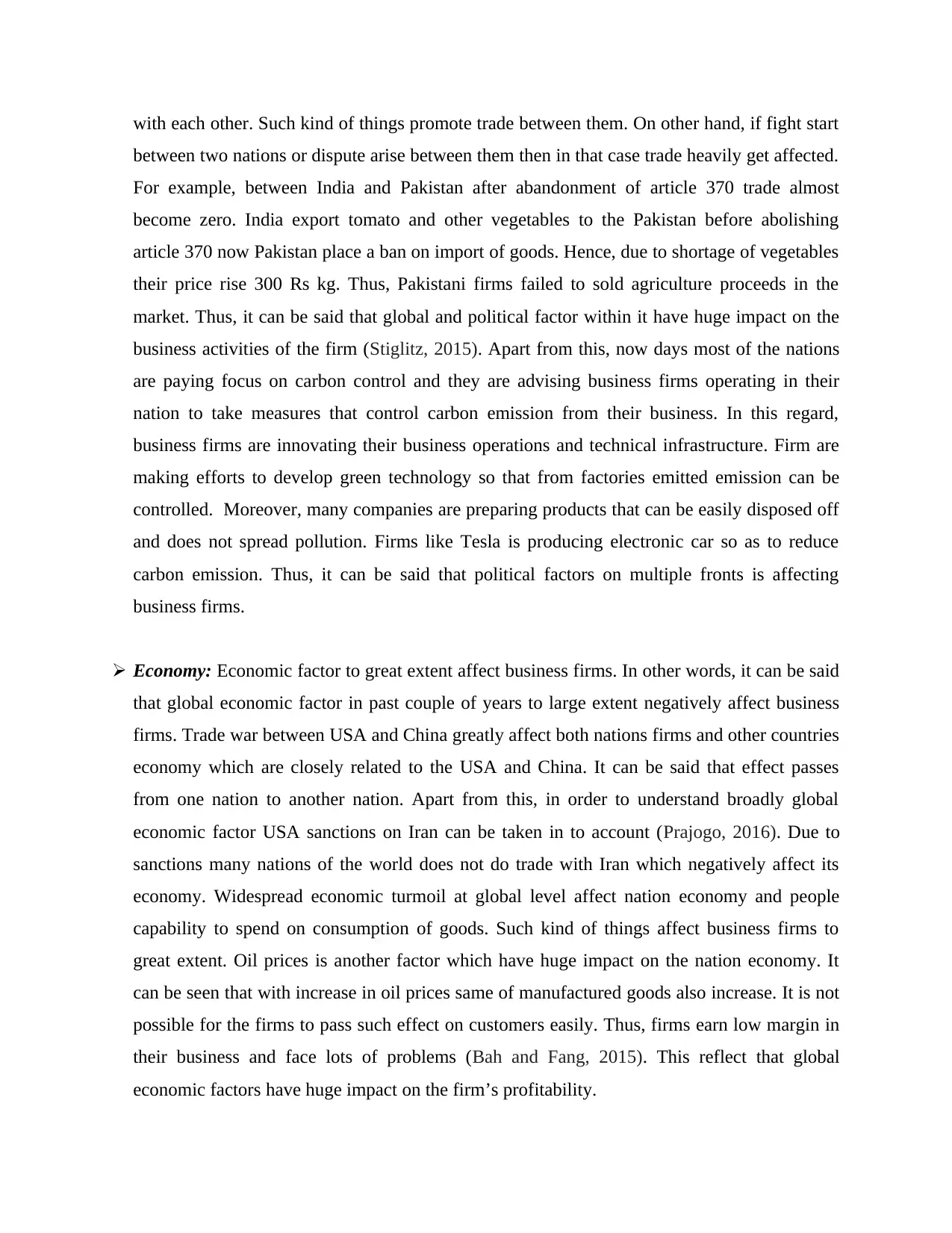
with each other. Such kind of things promote trade between them. On other hand, if fight start
between two nations or dispute arise between them then in that case trade heavily get affected.
For example, between India and Pakistan after abandonment of article 370 trade almost
become zero. India export tomato and other vegetables to the Pakistan before abolishing
article 370 now Pakistan place a ban on import of goods. Hence, due to shortage of vegetables
their price rise 300 Rs kg. Thus, Pakistani firms failed to sold agriculture proceeds in the
market. Thus, it can be said that global and political factor within it have huge impact on the
business activities of the firm (Stiglitz, 2015). Apart from this, now days most of the nations
are paying focus on carbon control and they are advising business firms operating in their
nation to take measures that control carbon emission from their business. In this regard,
business firms are innovating their business operations and technical infrastructure. Firm are
making efforts to develop green technology so that from factories emitted emission can be
controlled. Moreover, many companies are preparing products that can be easily disposed off
and does not spread pollution. Firms like Tesla is producing electronic car so as to reduce
carbon emission. Thus, it can be said that political factors on multiple fronts is affecting
business firms.
Economy: Economic factor to great extent affect business firms. In other words, it can be said
that global economic factor in past couple of years to large extent negatively affect business
firms. Trade war between USA and China greatly affect both nations firms and other countries
economy which are closely related to the USA and China. It can be said that effect passes
from one nation to another nation. Apart from this, in order to understand broadly global
economic factor USA sanctions on Iran can be taken in to account (Prajogo, 2016). Due to
sanctions many nations of the world does not do trade with Iran which negatively affect its
economy. Widespread economic turmoil at global level affect nation economy and people
capability to spend on consumption of goods. Such kind of things affect business firms to
great extent. Oil prices is another factor which have huge impact on the nation economy. It
can be seen that with increase in oil prices same of manufactured goods also increase. It is not
possible for the firms to pass such effect on customers easily. Thus, firms earn low margin in
their business and face lots of problems (Bah and Fang, 2015). This reflect that global
economic factors have huge impact on the firm’s profitability.
between two nations or dispute arise between them then in that case trade heavily get affected.
For example, between India and Pakistan after abandonment of article 370 trade almost
become zero. India export tomato and other vegetables to the Pakistan before abolishing
article 370 now Pakistan place a ban on import of goods. Hence, due to shortage of vegetables
their price rise 300 Rs kg. Thus, Pakistani firms failed to sold agriculture proceeds in the
market. Thus, it can be said that global and political factor within it have huge impact on the
business activities of the firm (Stiglitz, 2015). Apart from this, now days most of the nations
are paying focus on carbon control and they are advising business firms operating in their
nation to take measures that control carbon emission from their business. In this regard,
business firms are innovating their business operations and technical infrastructure. Firm are
making efforts to develop green technology so that from factories emitted emission can be
controlled. Moreover, many companies are preparing products that can be easily disposed off
and does not spread pollution. Firms like Tesla is producing electronic car so as to reduce
carbon emission. Thus, it can be said that political factors on multiple fronts is affecting
business firms.
Economy: Economic factor to great extent affect business firms. In other words, it can be said
that global economic factor in past couple of years to large extent negatively affect business
firms. Trade war between USA and China greatly affect both nations firms and other countries
economy which are closely related to the USA and China. It can be said that effect passes
from one nation to another nation. Apart from this, in order to understand broadly global
economic factor USA sanctions on Iran can be taken in to account (Prajogo, 2016). Due to
sanctions many nations of the world does not do trade with Iran which negatively affect its
economy. Widespread economic turmoil at global level affect nation economy and people
capability to spend on consumption of goods. Such kind of things affect business firms to
great extent. Oil prices is another factor which have huge impact on the nation economy. It
can be seen that with increase in oil prices same of manufactured goods also increase. It is not
possible for the firms to pass such effect on customers easily. Thus, firms earn low margin in
their business and face lots of problems (Bah and Fang, 2015). This reflect that global
economic factors have huge impact on the firm’s profitability.
⊘ This is a preview!⊘
Do you want full access?
Subscribe today to unlock all pages.

Trusted by 1+ million students worldwide
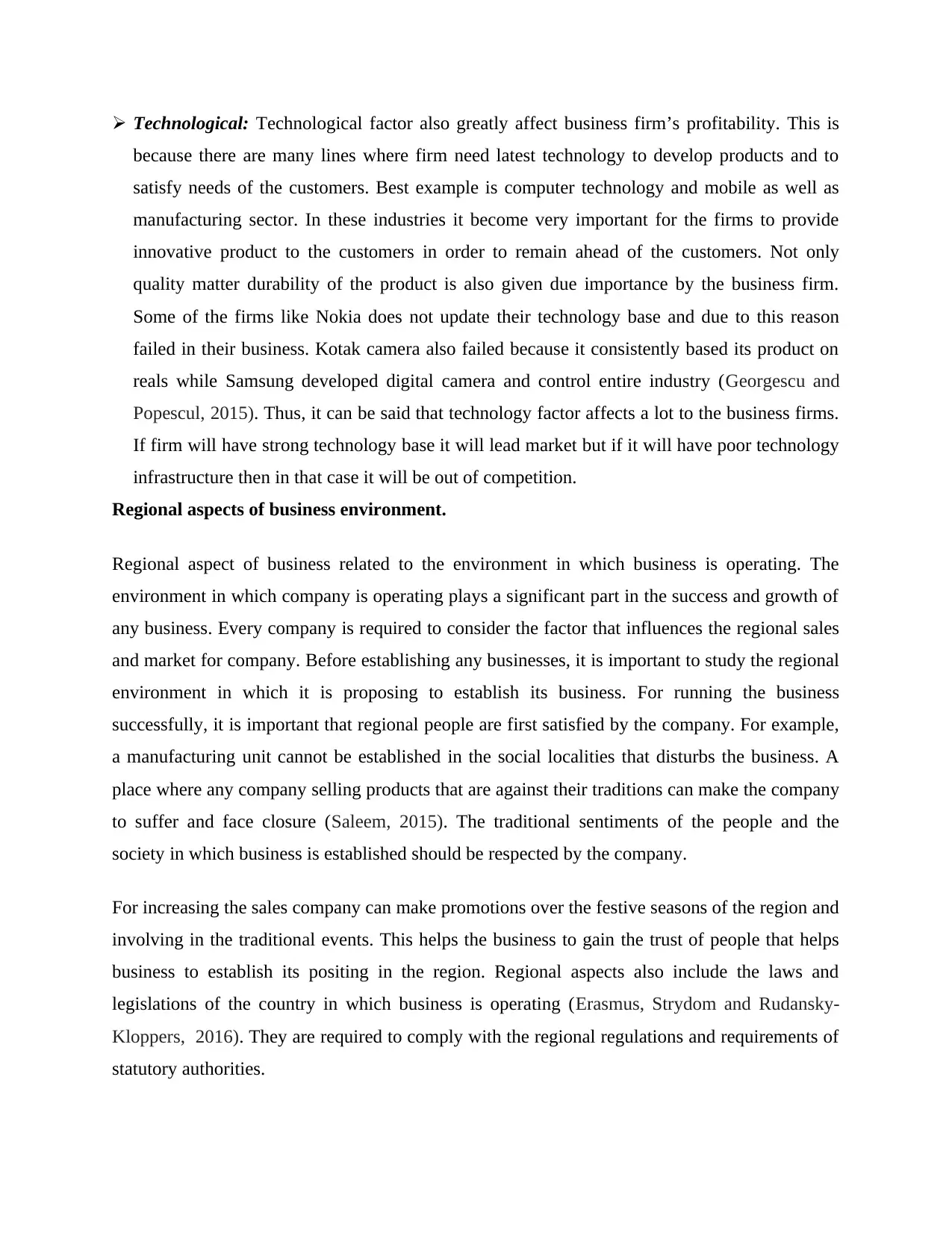
Technological: Technological factor also greatly affect business firm’s profitability. This is
because there are many lines where firm need latest technology to develop products and to
satisfy needs of the customers. Best example is computer technology and mobile as well as
manufacturing sector. In these industries it become very important for the firms to provide
innovative product to the customers in order to remain ahead of the customers. Not only
quality matter durability of the product is also given due importance by the business firm.
Some of the firms like Nokia does not update their technology base and due to this reason
failed in their business. Kotak camera also failed because it consistently based its product on
reals while Samsung developed digital camera and control entire industry (Georgescu and
Popescul, 2015). Thus, it can be said that technology factor affects a lot to the business firms.
If firm will have strong technology base it will lead market but if it will have poor technology
infrastructure then in that case it will be out of competition.
Regional aspects of business environment.
Regional aspect of business related to the environment in which business is operating. The
environment in which company is operating plays a significant part in the success and growth of
any business. Every company is required to consider the factor that influences the regional sales
and market for company. Before establishing any businesses, it is important to study the regional
environment in which it is proposing to establish its business. For running the business
successfully, it is important that regional people are first satisfied by the company. For example,
a manufacturing unit cannot be established in the social localities that disturbs the business. A
place where any company selling products that are against their traditions can make the company
to suffer and face closure (Saleem, 2015). The traditional sentiments of the people and the
society in which business is established should be respected by the company.
For increasing the sales company can make promotions over the festive seasons of the region and
involving in the traditional events. This helps the business to gain the trust of people that helps
business to establish its positing in the region. Regional aspects also include the laws and
legislations of the country in which business is operating (Erasmus, Strydom and Rudansky-
Kloppers, 2016). They are required to comply with the regional regulations and requirements of
statutory authorities.
because there are many lines where firm need latest technology to develop products and to
satisfy needs of the customers. Best example is computer technology and mobile as well as
manufacturing sector. In these industries it become very important for the firms to provide
innovative product to the customers in order to remain ahead of the customers. Not only
quality matter durability of the product is also given due importance by the business firm.
Some of the firms like Nokia does not update their technology base and due to this reason
failed in their business. Kotak camera also failed because it consistently based its product on
reals while Samsung developed digital camera and control entire industry (Georgescu and
Popescul, 2015). Thus, it can be said that technology factor affects a lot to the business firms.
If firm will have strong technology base it will lead market but if it will have poor technology
infrastructure then in that case it will be out of competition.
Regional aspects of business environment.
Regional aspect of business related to the environment in which business is operating. The
environment in which company is operating plays a significant part in the success and growth of
any business. Every company is required to consider the factor that influences the regional sales
and market for company. Before establishing any businesses, it is important to study the regional
environment in which it is proposing to establish its business. For running the business
successfully, it is important that regional people are first satisfied by the company. For example,
a manufacturing unit cannot be established in the social localities that disturbs the business. A
place where any company selling products that are against their traditions can make the company
to suffer and face closure (Saleem, 2015). The traditional sentiments of the people and the
society in which business is established should be respected by the company.
For increasing the sales company can make promotions over the festive seasons of the region and
involving in the traditional events. This helps the business to gain the trust of people that helps
business to establish its positing in the region. Regional aspects also include the laws and
legislations of the country in which business is operating (Erasmus, Strydom and Rudansky-
Kloppers, 2016). They are required to comply with the regional regulations and requirements of
statutory authorities.
Paraphrase This Document
Need a fresh take? Get an instant paraphrase of this document with our AI Paraphraser
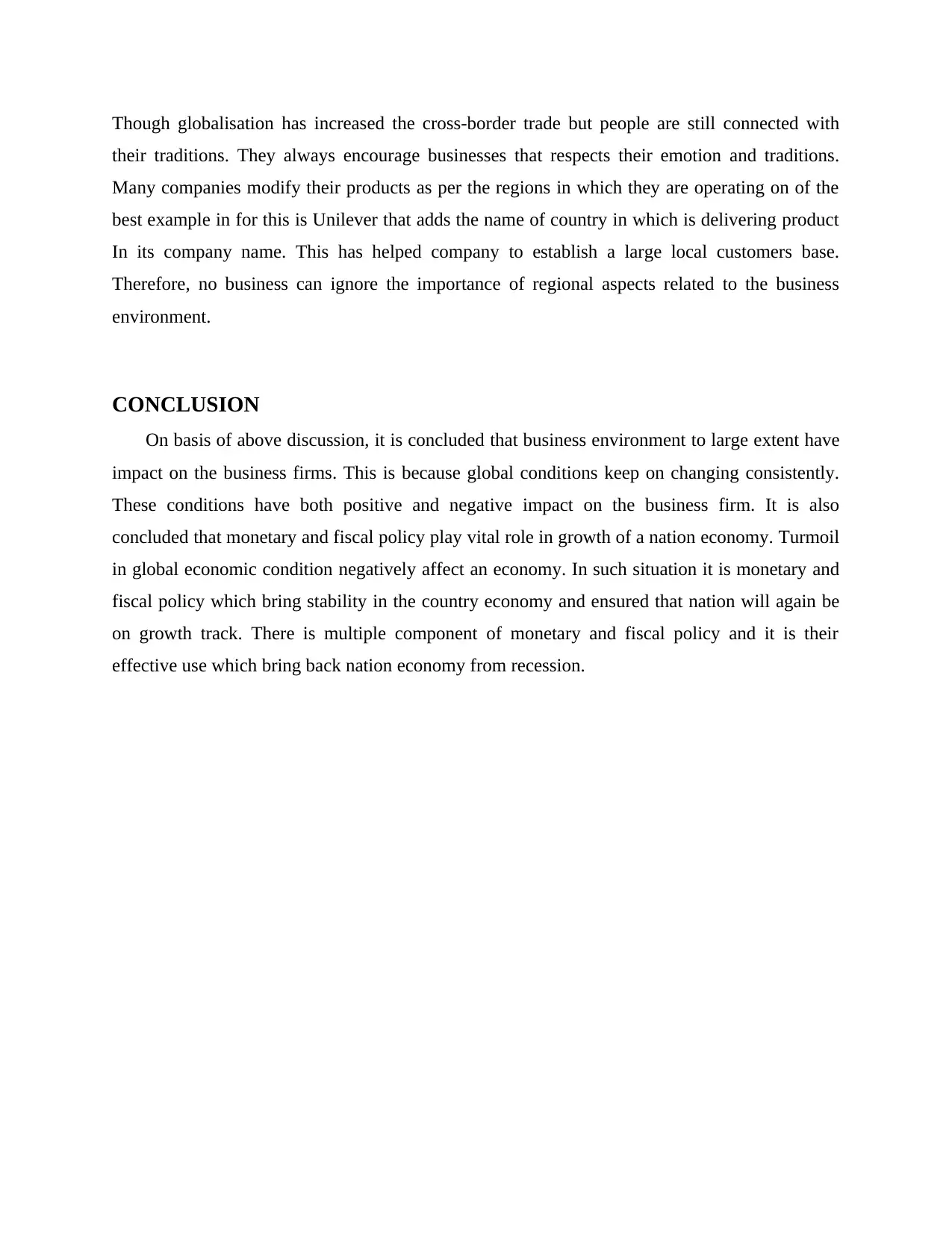
Though globalisation has increased the cross-border trade but people are still connected with
their traditions. They always encourage businesses that respects their emotion and traditions.
Many companies modify their products as per the regions in which they are operating on of the
best example in for this is Unilever that adds the name of country in which is delivering product
In its company name. This has helped company to establish a large local customers base.
Therefore, no business can ignore the importance of regional aspects related to the business
environment.
CONCLUSION
On basis of above discussion, it is concluded that business environment to large extent have
impact on the business firms. This is because global conditions keep on changing consistently.
These conditions have both positive and negative impact on the business firm. It is also
concluded that monetary and fiscal policy play vital role in growth of a nation economy. Turmoil
in global economic condition negatively affect an economy. In such situation it is monetary and
fiscal policy which bring stability in the country economy and ensured that nation will again be
on growth track. There is multiple component of monetary and fiscal policy and it is their
effective use which bring back nation economy from recession.
their traditions. They always encourage businesses that respects their emotion and traditions.
Many companies modify their products as per the regions in which they are operating on of the
best example in for this is Unilever that adds the name of country in which is delivering product
In its company name. This has helped company to establish a large local customers base.
Therefore, no business can ignore the importance of regional aspects related to the business
environment.
CONCLUSION
On basis of above discussion, it is concluded that business environment to large extent have
impact on the business firms. This is because global conditions keep on changing consistently.
These conditions have both positive and negative impact on the business firm. It is also
concluded that monetary and fiscal policy play vital role in growth of a nation economy. Turmoil
in global economic condition negatively affect an economy. In such situation it is monetary and
fiscal policy which bring stability in the country economy and ensured that nation will again be
on growth track. There is multiple component of monetary and fiscal policy and it is their
effective use which bring back nation economy from recession.
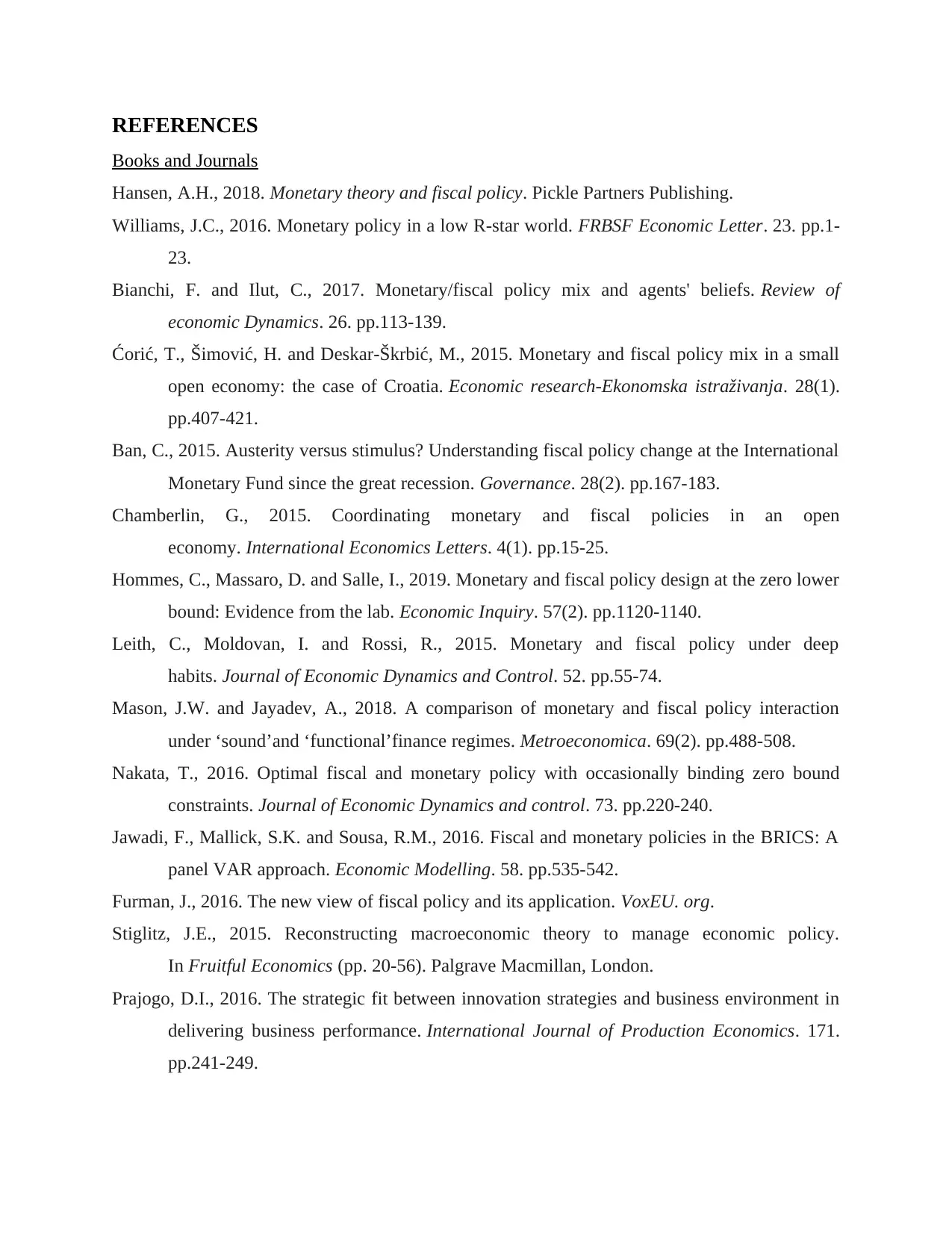
REFERENCES
Books and Journals
Hansen, A.H., 2018. Monetary theory and fiscal policy. Pickle Partners Publishing.
Williams, J.C., 2016. Monetary policy in a low R-star world. FRBSF Economic Letter. 23. pp.1-
23.
Bianchi, F. and Ilut, C., 2017. Monetary/fiscal policy mix and agents' beliefs. Review of
economic Dynamics. 26. pp.113-139.
Ćorić, T., Šimović, H. and Deskar-Škrbić, M., 2015. Monetary and fiscal policy mix in a small
open economy: the case of Croatia. Economic research-Ekonomska istraživanja. 28(1).
pp.407-421.
Ban, C., 2015. Austerity versus stimulus? Understanding fiscal policy change at the International
Monetary Fund since the great recession. Governance. 28(2). pp.167-183.
Chamberlin, G., 2015. Coordinating monetary and fiscal policies in an open
economy. International Economics Letters. 4(1). pp.15-25.
Hommes, C., Massaro, D. and Salle, I., 2019. Monetary and fiscal policy design at the zero lower
bound: Evidence from the lab. Economic Inquiry. 57(2). pp.1120-1140.
Leith, C., Moldovan, I. and Rossi, R., 2015. Monetary and fiscal policy under deep
habits. Journal of Economic Dynamics and Control. 52. pp.55-74.
Mason, J.W. and Jayadev, A., 2018. A comparison of monetary and fiscal policy interaction
under ‘sound’and ‘functional’finance regimes. Metroeconomica. 69(2). pp.488-508.
Nakata, T., 2016. Optimal fiscal and monetary policy with occasionally binding zero bound
constraints. Journal of Economic Dynamics and control. 73. pp.220-240.
Jawadi, F., Mallick, S.K. and Sousa, R.M., 2016. Fiscal and monetary policies in the BRICS: A
panel VAR approach. Economic Modelling. 58. pp.535-542.
Furman, J., 2016. The new view of fiscal policy and its application. VoxEU. org.
Stiglitz, J.E., 2015. Reconstructing macroeconomic theory to manage economic policy.
In Fruitful Economics (pp. 20-56). Palgrave Macmillan, London.
Prajogo, D.I., 2016. The strategic fit between innovation strategies and business environment in
delivering business performance. International Journal of Production Economics. 171.
pp.241-249.
Books and Journals
Hansen, A.H., 2018. Monetary theory and fiscal policy. Pickle Partners Publishing.
Williams, J.C., 2016. Monetary policy in a low R-star world. FRBSF Economic Letter. 23. pp.1-
23.
Bianchi, F. and Ilut, C., 2017. Monetary/fiscal policy mix and agents' beliefs. Review of
economic Dynamics. 26. pp.113-139.
Ćorić, T., Šimović, H. and Deskar-Škrbić, M., 2015. Monetary and fiscal policy mix in a small
open economy: the case of Croatia. Economic research-Ekonomska istraživanja. 28(1).
pp.407-421.
Ban, C., 2015. Austerity versus stimulus? Understanding fiscal policy change at the International
Monetary Fund since the great recession. Governance. 28(2). pp.167-183.
Chamberlin, G., 2015. Coordinating monetary and fiscal policies in an open
economy. International Economics Letters. 4(1). pp.15-25.
Hommes, C., Massaro, D. and Salle, I., 2019. Monetary and fiscal policy design at the zero lower
bound: Evidence from the lab. Economic Inquiry. 57(2). pp.1120-1140.
Leith, C., Moldovan, I. and Rossi, R., 2015. Monetary and fiscal policy under deep
habits. Journal of Economic Dynamics and Control. 52. pp.55-74.
Mason, J.W. and Jayadev, A., 2018. A comparison of monetary and fiscal policy interaction
under ‘sound’and ‘functional’finance regimes. Metroeconomica. 69(2). pp.488-508.
Nakata, T., 2016. Optimal fiscal and monetary policy with occasionally binding zero bound
constraints. Journal of Economic Dynamics and control. 73. pp.220-240.
Jawadi, F., Mallick, S.K. and Sousa, R.M., 2016. Fiscal and monetary policies in the BRICS: A
panel VAR approach. Economic Modelling. 58. pp.535-542.
Furman, J., 2016. The new view of fiscal policy and its application. VoxEU. org.
Stiglitz, J.E., 2015. Reconstructing macroeconomic theory to manage economic policy.
In Fruitful Economics (pp. 20-56). Palgrave Macmillan, London.
Prajogo, D.I., 2016. The strategic fit between innovation strategies and business environment in
delivering business performance. International Journal of Production Economics. 171.
pp.241-249.
⊘ This is a preview!⊘
Do you want full access?
Subscribe today to unlock all pages.

Trusted by 1+ million students worldwide
1 out of 13
Related Documents
Your All-in-One AI-Powered Toolkit for Academic Success.
+13062052269
info@desklib.com
Available 24*7 on WhatsApp / Email
![[object Object]](/_next/static/media/star-bottom.7253800d.svg)
Unlock your academic potential
Copyright © 2020–2026 A2Z Services. All Rights Reserved. Developed and managed by ZUCOL.





